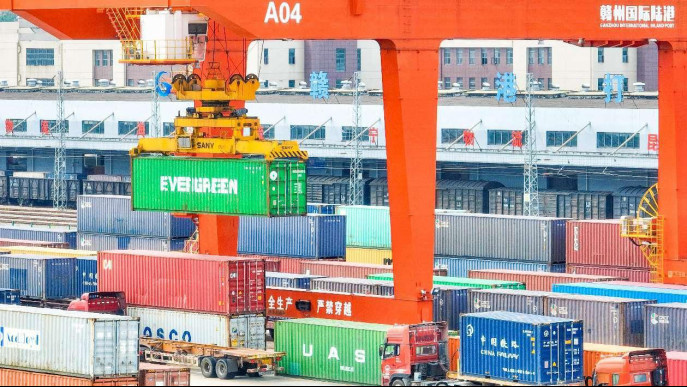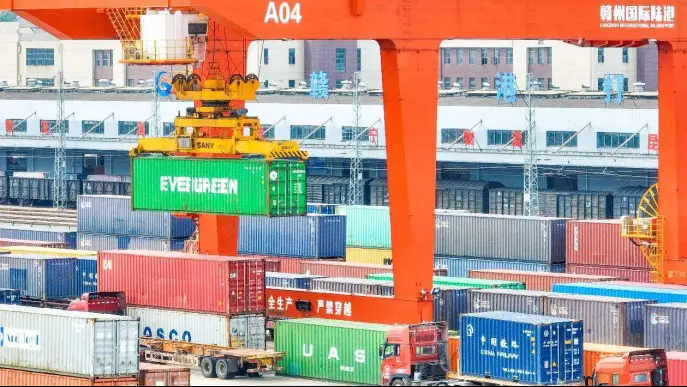By Zhang Jinruo, Cao Shiyun, Fan Fan, People's Daily

Containers are hoisted by cranes at an international land port in Ganzhou, east China's Jiangxi province. (Photo by Hu Jiangtao/People's Daily Online)
Recently, the Regional Comprehensive Economic Partnership (RCEP) celebrated the second anniversary of its entry into force. As a milestone achievement in the economic integration of the Asia-Pacific region, the RCEP serves as a vivid example of regional countries sharing development opportunities.
Over the past two years, regional trade costs have significantly decreased, and the industrial and supply chains have become more closely linked, benefiting an expanding range of people.
The RCEP has continued to drive the deepening of regional economic and trade cooperation, injecting strong momentum into the region's economic integration and development.
The RCEP encompasses various aspects of trade and investment liberalization and facilitation, with a key focus on tariff reduction and elimination. Over 90 percent of goods traded within the region will gradually enjoy zero tariffs.
PT Sany Perkasa is a joint venture between China's leading heavy-equipment manufacturer Sany Heavy Industry and an Indonesian company. It sells large machinery such as excavators and wheel loaders in Indonesia.
Zhang Zhaoqiang, general manager of PT Sany Perkasa, noted that after the implementation of the RCEP, the tariffs on wide-body trucks and dump trucks from China were reduced from 10 percent to zero.
"With the decrease in costs, our products have gained more competitiveness, allowing us to provide greater benefits to our customers," Zhang told People's Daily.
The total population, sum of gross domestic product and trade in goods of RCEP member countries all account for about 30 percent of the global share.
Chinese Ambassador to ASEAN Hou Yanqi noted that through unified tariff commitments, rules of origin, trade and investment liberalization and facilitation, and other trade rules, the RCEP has maximized the integration of the 27 trade arrangements and 44 investment agreements of its regional members. This effectively promotes the development of the multilateral trading system and brings tangible benefits to the participating parties, Hou added.
According to a report issued by the China Council for the Promotion of International Trade in September, 2023, the RCEP has played a significant role in promoting regional trade cooperation.
As of June 2023, the issuance volume of certificates of origin under the RCEP framework registered in China increased by over 25 percent year-on-year, significantly higher than the growth rate of international trade in the same period.
According to a report by Thai newspaper The Universal Daily News, the trade volume between Thailand and other RCEP members reached $327.28 billion in 2022, accounting for 55.45 percent of Thailand's total foreign trade.
Cambodia has also released encouraging data. From January to November 2023, Cambodia's trade volume with other RCEP members exceeded $26.5 billion, representing 61 percent of the country's total trade. The value of goods exported from Cambodia to other RCEP members increased by 27.29 percent from a year ago.
Cambodian Prime Minister Hun Manet said that facing uncertainties in global development, the RCEP holds significant importance in boosting countries' confidence in the multilateral trading system, promoting economic recovery, and achieving mutual benefits and win-win outcomes.
China was the first to complete the ratification process and submit its RCEP ratification document. It has implemented RCEP rules with high quality, fully delivered on its opening commitments and obligations under the agreement, and continuously pushed for tariff reductions and exemptions.
Upholding the vision of open development, China has promoted the high-quality implementation of RCEP.
"As the largest economy in the RCEP, China has benefited from its entry into force, and has also been an important contributor to RCEP cooperation," said Yuan Bo, director of the Institute of Asian Studies at the Chinese Academy of International Trade and Economic Cooperation under the Ministry of Commerce.
"China has played a positive role in promoting regional trade, investment and economic growth," she noted.
Since the implementation of the RCEP two years ago, China's trade in intermediate goods with other RCEP member countries has remained at a high level of 8 trillion yuan ($1.12 trillion).
Statistics show that in 2022, China's imports and exports with other RCEP member countries increased by 7.5 percent year-on-year. In the first 11 months of 2023, China's trade in intermediate goods with Cambodia and Laos reached 65.78 billion yuan and 29.55 billion yuan, respectively, up 2.4 percent and 35.8 percent from a year ago.
Immanuel Lingga, a senior official with Indonesia's Ministry of Trade, believed that China's implementation of the RCEP will enhance the resilience of regional and global value chains, given China's crucial position in the global value chain. The official said this will contribute to the steady progress of the regional economy.
Thanks to the customs clearance facilitation brought by the RCEP, in the first 11 months of 2023, China's imports of fresh durians from RCEP member countries such as Thailand and Vietnam totaled 46.61 billion yuan, which was 1.7 times that of the whole-year figure of 2021 before the agreement took effect. The continuous growth of China's trade in agricultural products with ASEAN is a reflection of the positive effects of tariff reduction and trade facilitation measures covered by the RCEP.
Over the past two years, China has worked together with relevant parties to comprehensively and effectively implement the RCEP, promoting the development of trade in goods, ensuring the effective implementation of preferential rules of origin, implementing customs procedures and trade facilitation rules with high standards, and improving the level of opening up in service trade, Hou noted.
She said these efforts have helped propel the regional economy forward against headwinds and unleash more dividends from the world's largest free trade area.
Over the past two years, regional trade costs have significantly decreased, and the industrial and supply chains have become more closely linked, benefiting an expanding range of people.
The RCEP has continued to drive the deepening of regional economic and trade cooperation, injecting strong momentum into the region's economic integration and development.
The RCEP encompasses various aspects of trade and investment liberalization and facilitation, with a key focus on tariff reduction and elimination. Over 90 percent of goods traded within the region will gradually enjoy zero tariffs.
PT Sany Perkasa is a joint venture between China's leading heavy-equipment manufacturer Sany Heavy Industry and an Indonesian company. It sells large machinery such as excavators and wheel loaders in Indonesia.
Zhang Zhaoqiang, general manager of PT Sany Perkasa, noted that after the implementation of the RCEP, the tariffs on wide-body trucks and dump trucks from China were reduced from 10 percent to zero.
"With the decrease in costs, our products have gained more competitiveness, allowing us to provide greater benefits to our customers," Zhang told People's Daily.
The total population, sum of gross domestic product and trade in goods of RCEP member countries all account for about 30 percent of the global share.
Chinese Ambassador to ASEAN Hou Yanqi noted that through unified tariff commitments, rules of origin, trade and investment liberalization and facilitation, and other trade rules, the RCEP has maximized the integration of the 27 trade arrangements and 44 investment agreements of its regional members. This effectively promotes the development of the multilateral trading system and brings tangible benefits to the participating parties, Hou added.
According to a report issued by the China Council for the Promotion of International Trade in September, 2023, the RCEP has played a significant role in promoting regional trade cooperation.
As of June 2023, the issuance volume of certificates of origin under the RCEP framework registered in China increased by over 25 percent year-on-year, significantly higher than the growth rate of international trade in the same period.
According to a report by Thai newspaper The Universal Daily News, the trade volume between Thailand and other RCEP members reached $327.28 billion in 2022, accounting for 55.45 percent of Thailand's total foreign trade.
Cambodia has also released encouraging data. From January to November 2023, Cambodia's trade volume with other RCEP members exceeded $26.5 billion, representing 61 percent of the country's total trade. The value of goods exported from Cambodia to other RCEP members increased by 27.29 percent from a year ago.
Cambodian Prime Minister Hun Manet said that facing uncertainties in global development, the RCEP holds significant importance in boosting countries' confidence in the multilateral trading system, promoting economic recovery, and achieving mutual benefits and win-win outcomes.
China was the first to complete the ratification process and submit its RCEP ratification document. It has implemented RCEP rules with high quality, fully delivered on its opening commitments and obligations under the agreement, and continuously pushed for tariff reductions and exemptions.
Upholding the vision of open development, China has promoted the high-quality implementation of RCEP.
"As the largest economy in the RCEP, China has benefited from its entry into force, and has also been an important contributor to RCEP cooperation," said Yuan Bo, director of the Institute of Asian Studies at the Chinese Academy of International Trade and Economic Cooperation under the Ministry of Commerce.
"China has played a positive role in promoting regional trade, investment and economic growth," she noted.
Since the implementation of the RCEP two years ago, China's trade in intermediate goods with other RCEP member countries has remained at a high level of 8 trillion yuan ($1.12 trillion).
Statistics show that in 2022, China's imports and exports with other RCEP member countries increased by 7.5 percent year-on-year. In the first 11 months of 2023, China's trade in intermediate goods with Cambodia and Laos reached 65.78 billion yuan and 29.55 billion yuan, respectively, up 2.4 percent and 35.8 percent from a year ago.
Immanuel Lingga, a senior official with Indonesia's Ministry of Trade, believed that China's implementation of the RCEP will enhance the resilience of regional and global value chains, given China's crucial position in the global value chain. The official said this will contribute to the steady progress of the regional economy.
Thanks to the customs clearance facilitation brought by the RCEP, in the first 11 months of 2023, China's imports of fresh durians from RCEP member countries such as Thailand and Vietnam totaled 46.61 billion yuan, which was 1.7 times that of the whole-year figure of 2021 before the agreement took effect. The continuous growth of China's trade in agricultural products with ASEAN is a reflection of the positive effects of tariff reduction and trade facilitation measures covered by the RCEP.
Over the past two years, China has worked together with relevant parties to comprehensively and effectively implement the RCEP, promoting the development of trade in goods, ensuring the effective implementation of preferential rules of origin, implementing customs procedures and trade facilitation rules with high standards, and improving the level of opening up in service trade, Hou noted.
She said these efforts have helped propel the regional economy forward against headwinds and unleash more dividends from the world's largest free trade area.
 Menu
Menu
 RCEP creates new opportunities for regional economic development
RCEP creates new opportunities for regional economic development
















